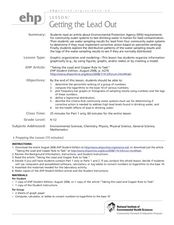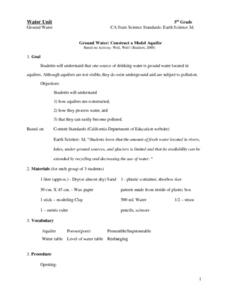Curated OER
Groundwater Modeling
Students evaluate the effects of point and non-pointy sources of water pollution using a model. They assess human impact on water quality. Students build a model which represents an aspect of the hydrosphere and compare their model with...
Curated OER
Water Density Boundaries
Young scholars create observable layers in water that represent a separation based upon density differences. They model density boundaries using differences in temperature and salinity. They, in groups, perform a meaningful experiment...
Curated OER
Water: On the Surface and in the Ground
Pupils explore the differences between surface water and ground water. They collect data using maps and graphs and investigate a Texas river basin and a nearby aquifer. They complete a written report including maps and data regarding the...
Curated OER
Water Resources
Students explore the differences between surface water and ground water. They collect data using maps and graphs and investigate a Texas river basin and a nearby aquifer. They complete a written report of their findings regarding the...
Illustrative Mathematics
Distance across the channel
Here you will find a model of a linear relationship between two quantities, the water depth of a channel and the distance across the channel at water level. The cross section of the channel is the shape of an isosceles trapezoid. The...
Chicago Botanic Garden
GEEBITT (Global Equilibrium Energy Balance Interactive TinkerToy)
Students use the GEEBITT excel model to explore how global average temperatures are affected by changes in our atmosphere in part two of this series of seven lessons. Working in groups, they discuss, analyze graphs, and enter data to...
University of California
Plankton
Plankton: so much more than just a SpongeBob character. Three different activities have kids looking at both phytoplankton and zooplankton in pictures, as well as collecting their own samples (depending on your access to a saltwater...
Chicago Botanic Garden
Understanding the Greenhouse Effect
Dive into the power of the sun with a two-part lesson. Budding scientists model the greenhouse effect in a hands-on activity, and then participate in a skit that explores the earth's energy balances and what really occurs in the...
Chicago Botanic Garden
Carbon, Greenhouse Gases, and Climate
Climate models mathematically represent the interactions of the atmosphere, oceans, land, sun, surface, and ice. Part two in the series of four lessons looks at the role greenhouse gases play in keeping Earth warm and has participants...
Institute of Electrical and Electronics Engineers
Waterproof that Roof!
Stop the raindrops from getting into the house! Eager engineers learn about roofing history and waterproofing by nanotechnology. They get into groups and work on designing a waterproof roof for a small model house. The accompanying...
Radford University
Fun with Solids
Geometry is all around us—if we're only willing to look. The final three activities of the Fun with Solids unit continue work on surface area and volume. For lesson three, scholars investigate the formulas for spheres and solve a problem...
Curated OER
Creating the Ideal Cargo Boat
Students build boats out of clay to test the buoyancy of the boat in water. Students break into pairs and construct their boat to specific guide lines, then experiment with their boat in the water.
EngageNY
Truncated Cones
Learners examine objects and find their volumes using geometric formulas in the 21st installment of this 25-part module. Objects take the shape of truncated cones and pyramids, and individuals apply concepts of similar triangles to find...
Curated OER
Oil Trap Model
Students investigate oil accumulation by creating a model in their classroom. In this petroleum geology lesson, students discuss where oil comes from and why it is vital to our society at this particular time. Students cut out a 3-D...
Curated OER
Coral Reefs
Students research an inhabitant of a Caribbean coral reef using a list of common organisms that live on or near it. Students then write a description of their organism and draw a picture or a 3-D model of it. Eventually they all work...
Columbus City Schools
You Can’t Sneeze On This Tissue
Take your class' understanding of cells to the next level... or levels! Demonstrate the levels of organization using a variety of engaging methods. The teacher's guide includes the materials you'll need to execute a flower...
Curated OER
Getting the Lead Out
The article for this lesson no longer accessible through the links in the lesson plan, but can be found in the National Center for Biotechnology Information website. After reading it, environmental science students answer questions and...
Curated OER
Our Water Resources
Students build a model aquifer to study groundwater zones and water table formation. Students use the models to measure the movement of polluted groundwater.
Curated OER
Ground Water: Construct a Model Aquifer
Students recognize that one source of drinking water is ground water located in aquifers. They create a model of an aquifer and summarize their experience in a report.
Curated OER
Will There be Enough Water?
Learners investigate water usage, water available, and water demand historically in the local area. They use projections of water usage, availability and demand up to the year 2050. Students use graphs to relate as well as compare and...
Curated OER
Water in the Texas Coastal Basins
Learners, after researching a Texas coastal basin, map and graph the information they collect and then translate it into a short report to be presented to their classmates. They brainstorm unique ways to maintain Texas estuaries as well...
NASA
Earth's Global Energy Budget
Introduce your earth science enthusiasts to the earth's energy budget. Teach them using an informative set of slides that include illuminating lecturer's notes, relevant vocabulary, embedded animations, colorful satellite maps, and a...
Curated OER
Cranimals in 3D
Students design their own mix and match animals, using lesson framework that emphasizes transformation, explore differences between clay and model magic, experiment with clay, and shape their animals into 3D sculptures.
Curated OER
Cell Size and Shape; Diffusion and Osmosis Processes
Use salmon eggs as a cell model for demonstrating the movement of water over concentration gradients. Junior scientists examine the same process microscopically with an onion cell. They use a thistle tube and a semipermeable membrane to...























